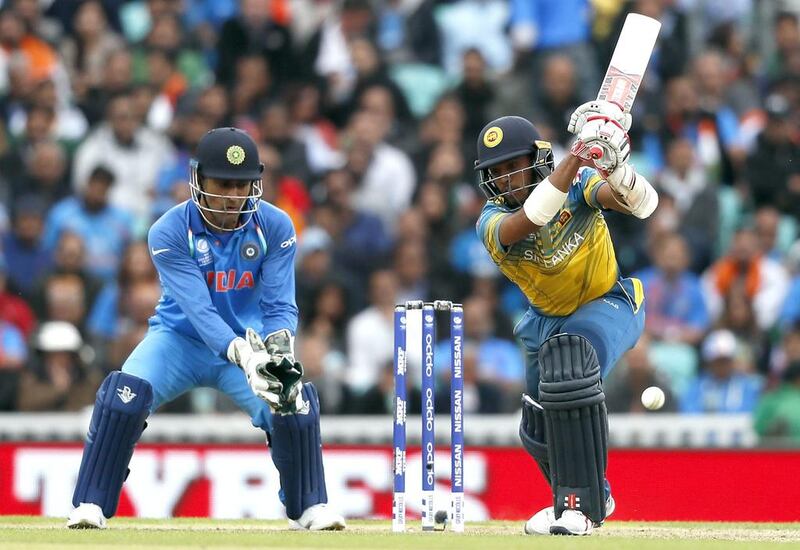The first time India and Sri Lanka met on the global stage, at the 1979 World Cup, the islanders did not even have Test status. They won by 47 runs, with Duleep Mendis smashing three sixes in a 57-ball 64, an extraordinary innings by the standards of the time.
There was also a 23-run cameo from Sudath Pasqual, a 17 year old who would never represent his country again. By the time Sri Lanka earned Test status in 1982, he was on his way to the United States to do a masters degree in political science.
In the years since, Sri Lanka have developed a habit of bloodying Indian noses in the events that matter.
When the subcontinent hosted the World Cup in 1996, Sri Lanka won both matches, in Delhi and, crucially, the semi-final in Kolkata.
They pushed India through the exit door at the 2007 World Cup, and upset MS Dhoni’s previously unbeaten side in the World Twenty20 final in 2014.
This ultimately comfortable victory over India at The Oval, a venue with a special place in Sri Lankan hearts – the great Muttiah Muralitharan took 16 wickets there in a famous Test win in August 1998 – was perhaps the least expected.
Sri Lanka had looked a shambles, especially with the bat, in the loss to South Africa, while India’s bowlers had bullied Pakistan into submission.
The Lankans had only once overhauled a total in excess of 320, at Headingley in 2006, and the chase did not exactly begin well, with Niroshan Dickwella departing early.
But Kusal Mendis and Danushka Gunathilaka batted with the poise of veterans to add 159, and rattle Virat Kohli such that he brought himself on to bowl.
Mendis, no relation to the ’79 star, is best known for transforming a Test series against Australia last year, but here he showed that he could ace the 50-over format as well.
There was good fortune, with a couple of top edges flying over Dhoni, but he was instrumental in hitting both Ravindra Jadeja and Hardik Pandya out of the attack, and thus disrupting India’s favoured mid-innings bowling strategy.
__________________________________
Also from Dileep Premachandran
■ Yuvraj Singh revival: Once again central to India's batting
■ Five to watch: Who will become household names
__________________________________
Jadeja, whose metronome-style bowling played a big part in the Champions Trophy victory in 2013, was struck for three fours and a six, while Pandya – who conceded just three in this first two overs – went for 48 in his last five.
With Umesh Yadav also leaking runs, India suddenly looked extremely vulnerable.
Talk in the run-up to the game had been of the strength in depth that allowed them to keep R Ashwin and Mohammed Shami on the bench.
As the game slipped away, with Angelo Mathews and Asela Gunaratne striking boundaries at will, more than a few minds and cameras turned to the dressing-room viewing arena. It would be a huge surprise if Ashwin did not play what has now effectively become a quarter-final against South Africa.
But India did not just lose the match with the ball.
It would seem harsh in the extreme to criticise a line-up that accumulated 321, but once again India were guilty of mid-innings tardiness. Given how they prefer the steady approach at the start – 48 came in the first 10 overs, par for their performances since the 2015 World Cup – it is imperative that there’s acceleration thereafter.
At 30 overs, India were 169-2. But they would not double that tally, as only 49 came in the next 10-over block.
Yuvraj Singh, in sensational touch against Pakistan, was becalmed, and the late surge from Dhoni did not prove to be enough.
Before this game, the 26-year-old Gunathilaka was nearly as much of an unknown as Pasqual 38 years earlier.
But though he and Mendis were run out before the job was done, Mathews – who showed plenty of glimpses of class in a superb half-century – ensured that Sri Lanka would not be denied their own winner-take-all match against Pakistan.
The hero of the day, however, was Kusal Perera, another 26 year old who has had a patchy international career.
With both set batsmen dismissed and the chase in danger of unravelling, he showed tremendous composure and courage to craft 47 off 44 before a leg injury forced him off.
On the day, India had no answer to such desire.
sports@thenational.ae
sports@thenational.ae
Follow us on Twitter @NatSportUAE
Like us on Facebook at facebook.com/TheNationalSport





